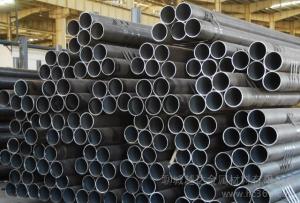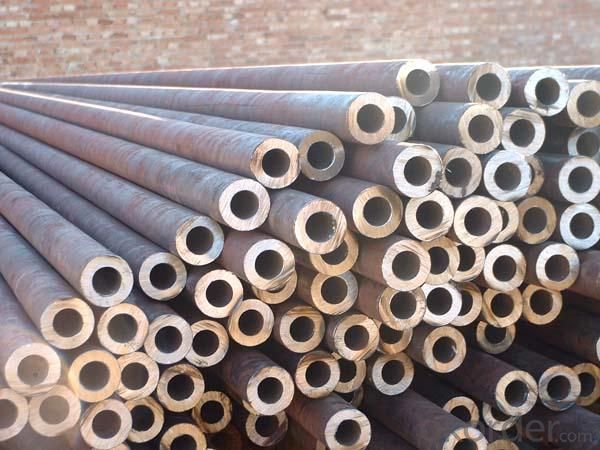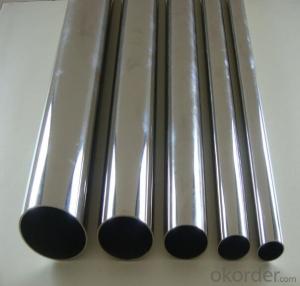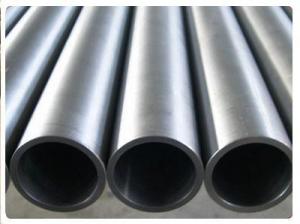Seamless Steel Pipe for Industrial Gas Cylinder
- Loading Port:
- China Main Port
- Payment Terms:
- TT or LC
- Min Order Qty:
- 5mt m.t.
- Supply Capability:
- 5000 Tons Per Month m.t./month
OKorder Service Pledge
OKorder Financial Service
You Might Also Like
Seamless Steel pipes
Application of Seamless Steel Pipe for for Industrial Gas Cylinder
The company products including seamless steel gas cylinder
for industry and medical gas use. We can make cylinder
Standard of Seamless Steel Pipe for for Industrial Gas Cylinder
apply to standard of DOT3AA, JIS8241, EN1964,ISO9809,GB5099, KSB6210.
Certificate of Seamless Steel Pipe for for Industrial Gas Cylinde
CCS,BV, LLODY'S, ABS.
Description of Seamless Steel Pipe for for Industrial Gas Cylinde
Standard | GB5099 |
Material | 34Mn2V/37Mn/30CrMo |
Nominal Diameter | 219/232/267/279/325(mm) |
Water Capacity | 20-80(L) |
Nominal Height | 815-1780(mm) |
Nominal Weight | 30.5-103(kg) |
Service Pressure | 15/20(MP) |
Wall Thickness | 4.7-7.0(mm) |
Packing of Seamless Steel Pipe for for Industrial Gas Cylinde
Black paint or varnish ,plastic caps with the both end
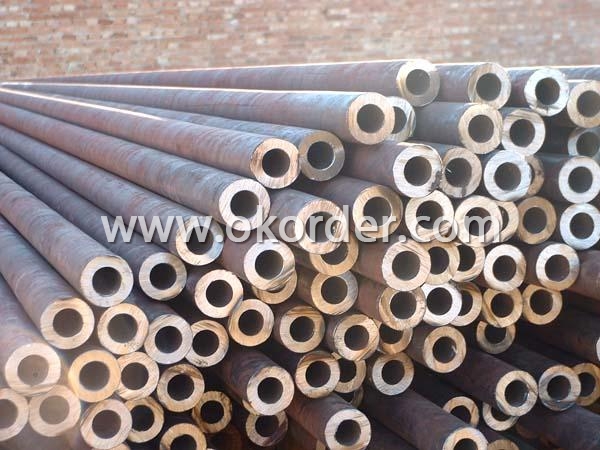
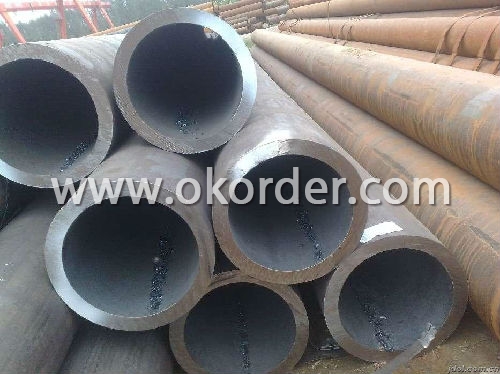
- Q: What are the common applications of steel pipes in the oil and gas industry?
- Steel pipes are commonly used in the oil and gas industry for various applications such as drilling, production, transportation, and distribution of oil and gas. They are utilized for casing and tubing in oil wells, conveying fluids in pipelines, and supporting infrastructure for refineries and processing plants. Additionally, steel pipes are crucial for offshore drilling operations and are employed in the construction of platforms and subsea pipelines.
- Q: What are the different types of steel pipe bends for pipeline routing?
- There are several types of steel pipe bends commonly used for pipeline routing, including the 90-degree bend, 45-degree bend, and the 180-degree bend. Additionally, there are also custom bends available, such as S-bends, U-bends, and offset bends, which are used in specific situations to accommodate unique pipeline routing requirements.
- Q: How are steel pipes recycled at the end of their life cycle?
- Steel pipes are typically recycled at the end of their life cycle through a process called steel recycling. This involves collecting the used pipes, separating them from other materials, and then melting them down to be formed into new steel products. The recycling process not only helps conserve valuable resources but also reduces the need for new steel production, making it an environmentally sustainable solution.
- Q: Are steel pipes suitable for transporting fluids?
- Yes, steel pipes are suitable for transporting fluids. They have high tensile strength, durability, and resistance to corrosion, making them an ideal choice for transporting various fluids, including water, oil, gas, and chemicals, over long distances. Steel pipes are commonly used in industries such as oil and gas, water treatment, and manufacturing due to their ability to withstand high pressure and temperature conditions.
- Q: What is the bending strength of steel pipes?
- The bending strength of steel pipes refers to the ability of a steel pipe to withstand bending forces without breaking or permanently deforming. The bending strength of steel pipes can vary depending on various factors such as the type and grade of steel, the diameter and thickness of the pipe, and the manufacturing process. Steel pipes are known for their high strength and durability, making them suitable for a wide range of applications. The bending strength of steel pipes is typically expressed in terms of the maximum bending moment or the maximum stress that the pipe can withstand without failure. To determine the bending strength of a steel pipe, engineers and manufacturers use various testing methods such as three-point or four-point bending tests. These tests apply a known force or moment to the pipe and measure its deflection or stress response. The bending strength of steel pipes can also be influenced by the pipe's mechanical properties, including yield strength, tensile strength, and elongation. These properties determine the overall strength and ductility of the steel, which play a vital role in its bending strength. It is important to note that the bending strength can vary depending on the specific application and load conditions. For example, pipes used in structural or load-bearing applications may require higher bending strength compared to pipes used for plumbing or conveyance purposes. In summary, the bending strength of steel pipes is determined by various factors such as the type and grade of steel, diameter and thickness of the pipe, and the manufacturing process. Testing methods and mechanical properties are used to evaluate the bending strength of steel pipes, ensuring their suitability for different applications and load conditions.
- Q: What are the different methods of pipe support for steel pipes?
- There are several methods of pipe support for steel pipes, including clamps, hangers, brackets, and guides. Clamps are used to secure pipes to a structure, while hangers suspend the pipes from overhead supports. Brackets provide lateral support and stability, and guides are used to control pipe movement and prevent excessive sagging. These various methods ensure the proper installation and stability of steel pipes in different applications.
- Q: How are steel pipes inspected for quality?
- The quality of steel pipes undergoes a thorough examination process involving diverse techniques and standards. Trained professionals conduct visual inspections to scrutinize the pipes for visible defects such as cracks, dents, or surface irregularities. This examination guarantees that the pipes meet the required specifications and are devoid of any visible flaws. Furthermore, non-destructive testing (NDT) methods are utilized to assess the internal and external quality of the steel pipes. Among the commonly used NDT techniques, ultrasonic testing stands out. This method involves transmitting ultrasonic waves through the pipes to detect any internal defects or inconsistencies in the material. It effectively identifies issues such as variations in wall thickness, inclusions, or weld defects that could compromise the pipe's integrity. Another widely employed NDT technique is magnetic particle inspection. By utilizing magnetic fields and iron particles, this method identifies surface cracks or flaws in the steel pipes. It is particularly effective for detecting defects in ferromagnetic materials and can be performed on both the outer and inner surfaces of the pipes. Moreover, hydrostatic testing is frequently conducted to evaluate the strength and pressure resistance of the pipes. This process involves filling the pipes with water or a suitable fluid and subjecting them to a specified pressure to check for leaks or structural weaknesses. This test ensures that the pipes can withstand the intended operational conditions without failing. In addition to these techniques, various quality control measures are implemented throughout the manufacturing process. These measures include material traceability, dimensional checks, and chemical composition analysis. They play a crucial role in ensuring that the steel pipes meet the required standards and specifications, thereby guaranteeing their quality and reliability. In summary, the inspection of steel pipes for quality involves a comprehensive approach encompassing visual inspection, non-destructive testing methods, and quality control measures. These thorough procedures enable the identification of defects, inconsistencies, or weaknesses, ensuring that the pipes meet the necessary quality standards and are suitable for their intended purpose.
- Q: Is the seamless steel pipe used in the market hot or cold drawn?
- Outside diameter 89, most are cold drawn, more than 89 hot rolling.
- Q: How are steel pipes protected from damage during transportation?
- Steel pipes are protected from damage during transportation through various methods. One common method is the use of protective coatings. Steel pipes are often coated with materials such as epoxy, zinc, or polyethylene to create a barrier between the pipe and external elements. These coatings help to prevent corrosion and damage during transit. Furthermore, steel pipes are often bundled together and secured using straps or bands. This bundling helps to keep the pipes in place and prevents them from shifting or rolling during transportation. Additionally, padding or cushioning materials such as foam or rubber may be used to provide extra protection and minimize the risk of damage from impact or vibration. In some cases, steel pipes may be placed in crates or containers to provide additional protection. Crates are designed to fit the pipes snugly and provide a secure enclosure that prevents external forces from causing damage. Containers, on the other hand, offer a protective environment for the pipes, shielding them from the elements and potential impacts. To ensure the safe transportation of steel pipes, it is also important to consider proper handling and loading techniques. Pipes should be carefully lifted and loaded onto transport vehicles using appropriate equipment, such as cranes or forklifts, to minimize the risk of damage. Proper securing of the pipes within the transport vehicle is crucial to prevent movement and potential damage during transit. Overall, a combination of protective coatings, bundling, padding, and secure packaging or loading techniques are employed to safeguard steel pipes from damage during transportation. These measures help to ensure that the pipes arrive at their destination in optimal condition, ready for use in various applications.
- Q: What is a tight steel tube?
- The fully enclosed steel tube is called "sleeve connection steel pipe". The English abbreviation is JDG. The sleeve between the pipe and the pipe is fastened by screws. The current specification is the construction and acceptance rules of CECS 120:2007 sleeve steel conduit pipe line
1. Manufacturer Overview
| Location | Zhejiang, China |
| Year Established | 2007 |
| Annual Output Value | Below US$1 Million |
| Main Markets | |
| Company Certifications | API;ISO9001 |
2. Manufacturer Certificates
| a) Certification Name | |
| Range | |
| Reference | |
| Validity Period |
3. Manufacturer Capability
| a) Trade Capacity | |
| Nearest Port | Shanghai |
| Export Percentage | 41% - 50% |
| No.of Employees in Trade Department | 300-500 People |
| Language Spoken: | English; Chinese |
| b) Factory Information | |
| Factory Size: | 360,000 Squre meters |
| No. of Production Lines | Above 10 |
| Contract Manufacturing | OEM Service Offered;Design Service Offered |
| Product Price Range | High Average |
Send your message to us
Seamless Steel Pipe for Industrial Gas Cylinder
- Loading Port:
- China Main Port
- Payment Terms:
- TT or LC
- Min Order Qty:
- 5mt m.t.
- Supply Capability:
- 5000 Tons Per Month m.t./month
OKorder Service Pledge
OKorder Financial Service
Similar products
Hot products
Hot Searches
Related keywords
